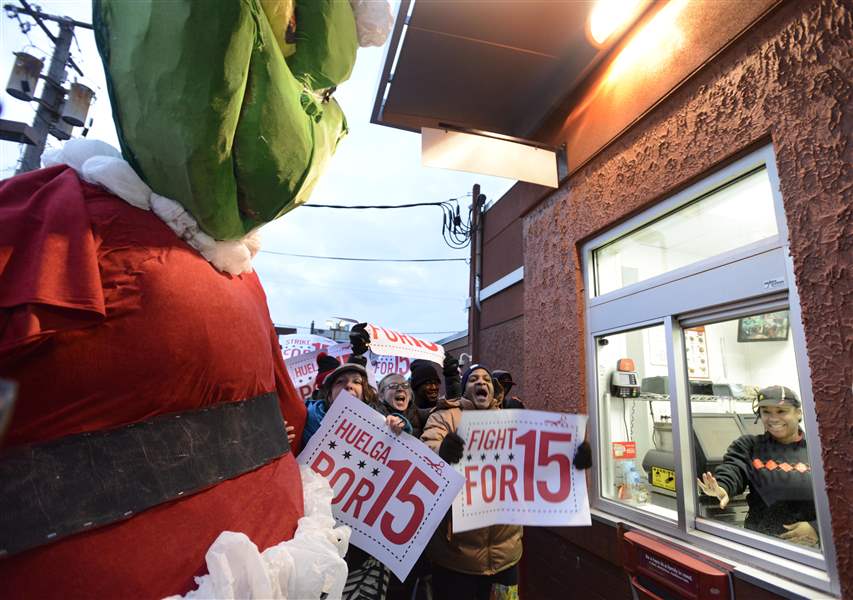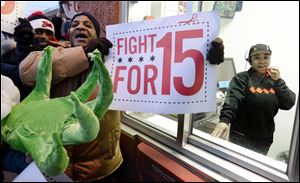
Fast-food strikes return amid push for wage hikes
12/5/2013
Demonstrators rally for better wages outside a McDonald's restaurant in Chicago, Thursday, Dec., 5, 2013. Demonstrations planned in 100 cities are part of a push by labor unions, worker advocacy groups and Democrats to raise the federal minimum wage of $7.25. (AP Photo/Paul Beaty)
ASSOCIATED PRESS

Demonstrators protest for higher wages outside a McDonalds restaurant in Chicago.
NEW YORK — Fast-food workers and labor organizers are marching, waving signs and chanting in cities across the country today amid a push for higher wages.
Organizers say walkouts are planned in 100 cities, with rallies set for another 100 cities. But it’s not clear what the actual turnout will be, how many of the participants are workers and what impact they’ll have on restaurant operations.
The actions would mark the largest showing yet in a push that began a year ago. At a time when there’s growing national and international attention on economic disparities, labor unions, worker advocacy groups and Democrats are hoping to build public support to raise the federal minimum wage of $7.25, or about $15,000 a year for full-time work.
Protesters are calling for pay of $15 an hour, but the figure is seen more as a rallying point than a near-term possibility.
In New York City, about 100 protesters blew whistles and beat drums while marching into a McDonald’s at around 6:30 a.m.; one startled customer grabbed his food and fled as they flooded the restaurant, while another didn’t look up from eating and reading amid their chants of “We can’t survive on $7.25!”
Community leaders took turns giving speeches for about 15 minutes until the police arrived and ordered protesters out of the store. The crowd continued to demonstrate outside for about 45 minutes. A McDonald’s manager declined to be interviewed and asked that the handful of customers in the store not be bothered.
In Detroit, about 50 demonstrators turned out for a pre-dawn rally in front of a McDonald’s. A handful of employees walked off the job, but the restaurant stayed open as a manager and other employees worked the front counter and drive-thru window.
Julius Waters, a 29-year-old McDonald’s maintenance worker who was among the protesters, said it’s hard making ends meet on his wage of $7.40 an hour.
“I need a better wage for myself, because, right now, I’m relying on aid, and $7.40 is not able to help me maintain taking care of my son. I’m a single parent,” Waters said.
In Atlanta, about 40 demonstrators rallied at a Burger King; another demonstration was planned later in the day.
The push for higher pay in the fast-food industry faces an uphill battle. The industry competes aggressively on value offerings and companies have warned that they would need to raise prices if wages were hiked. Most fast-food locations are also owned and operated by franchisees, which lets companies such as McDonald’s Corp., Burger King Worldwide Inc. and Yum Brands Inc. say that they don’t control worker pay.
However, labor advocates have pointed out that companies control many other aspects of restaurant operations through their franchise agreements, including menus, suppliers and equipment.
Fast-food workers have historically been seen as difficult to unionize, given the industry’s high turnover rates. But the Service Employees International Union, which represents more than 2 million workers in health care, janitorial and other industries, has been providing considerable organizational and financial support to the push for higher pay over the past year.
Berlin Rosen, a political consulting and public relations firm based in New York City, also has been coordinating communications efforts and connecting organizers with media outlets.
The National Restaurant Association, an industry lobbying group, said most those protesting were union workers and that “relatively few” workers have participated in past actions. It called the demonstrations a “campaign engineered by national labor groups.”
McDonald’s said in a statement that it’s “committed to providing our employees with opportunities to succeed.” The company, based in Oak Brook, Ill., said it offers employees advancement opportunities, competitive pay and benefits.
In the meantime, the protests are getting some high-powered support from the White House. In an economic policy speech Wednesday, President Barack Obama specifically mentioned fast-food and retail workers “who work their tails off and are still living at or barely above poverty” in his call for raising the federal minimum wage.
Labor Secretary Thomas Perez also offered words of support for the protesters on the agency’s blog.
“We see momentum gathering and a consensus emerging around the idea that we need to increase the federal minimum wage, to give these workers and millions like them a fair day’s pay for a fair day’s work,” Perez said in the statement.
Senate Majority Leader Harry Reid, D-Nev., has promised a vote on the wage hike by the end of the year. But the measure is not expected to gain traction in the House, where Republican leaders oppose it.
Supporters of wage hikes have been more successful at the state and local level. California, Connecticut and Rhode Island raised their minimum wages this year. Last month, voters in New Jersey approved an increase in the minimum to $8.25 an hour, up from $7.25 an hour.